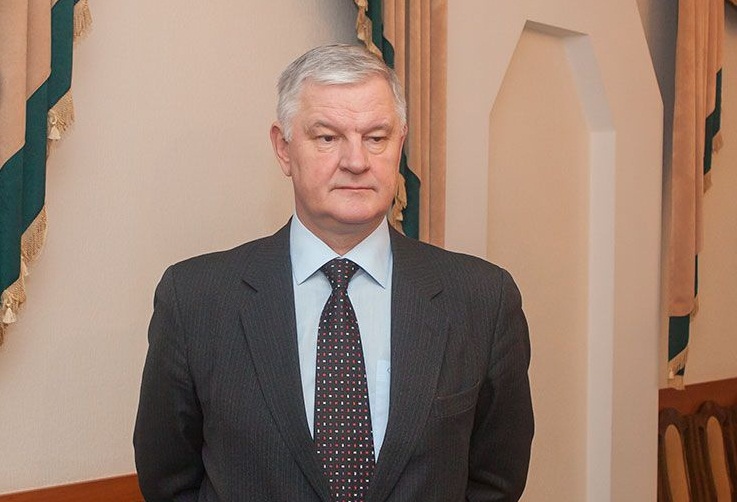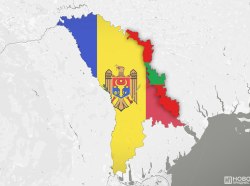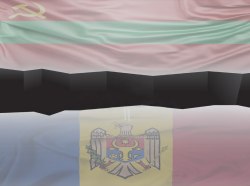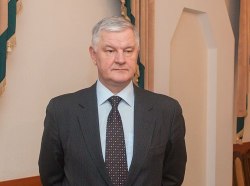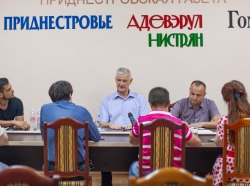On July 10, 2024, the Supreme Council of the Pridnestrovian Moldavian Republic adopted a Statement “regarding the destructive propaganda of the Parliamentary Assembly of the Organization for Security and Cooperation in Europe.” That is, the OSCE PA.
The reason for the adoption of this document by Pridnestrovian parliamentarians was this. A few days before the Pridnestrovian document, members of this same OSCE Parliamentary Assembly gathered in Bucharest and came up with a Resolution “On the deterioration of human rights in the Pridnestrovian region of the Republic of Moldova.” That's what they call the Pridnestrovian Moldavian Republic.
The essence of the unfounded resolution is as follows.
Firstly, the participants of the Bucharest Forum “welcome the unprecedented reform program of the Government of the Republic of Moldova”, without saying that since 2020, these “reforms” have resulted in a drop in production, mass migration of the population from Moldova, an unprecedented increase in interethnic tension and the severance of mutually beneficial ties with Russia and the CIS.
Secondly, the OSCE PA showed its politicization, “persistently calling on the Government of the Republic of Moldova to continue work on integration as a full member of the EU.”
Thirdly, the PMR is accused of “numerous violations of fundamental human rights and freedoms,” and the political system of our country is called “authoritarian.” Responsibility for alleged “human rights violations” is also placed on Russia.
Fourthly, the Pridnestrovian security forces are called “illegal”, while the Pridnestrovian media are “strictly controlled” by the “separatist” regime.
Fifthly, (and this is one of the main theses of the resolution) it is stated that the internationally recognized 5 + 2 format allegedly “does not function”, followed by a demand to “withdraw Russian Armed Forces and ammunition” from the banks of the Dniester.
Sixth, the OSCE PA, whose resolutions, we note, are of a recommendatory nature, demands “free access to the Pridnestrovian region for public officials” of Moldova in order to “fulfill their duties.” That is, we are talking about the dismantling of Pridnestrovian statehood and the transfer of Pridnestrovie under the authority of the current pro-Romanian nationalist regime in Chisinau.
Seventh, in order to deprive the PMR of control over the situation in the Security Zone of the Moldovan-Pridnestrovian conflict, Westerners from the OSCE PA demand that Tiraspol “remove illegally installed posts along the perimeter of the Security Zone.”
Eighth, the question is raised about “removing all restrictions imposed on the activities of public authorities of the Republic of Moldova” in Pridnestrovie, that is, again it is necessary to destroy the PMR`s statehood and place the Pridnestrovians under the control of pro-Romanian nationalists in Chisinau.
Ninth, the document refers to “support for the authorities of the Republic of Moldova in... the rule of law throughout the country.” That is the same as in the previous paragraph.
These are the main points of the Bucharest resolution, which resembles the backs of the Moldovan and Romanian propaganda of 1990-1992. How did such degradation of Western parliamentarians become possible? The fact is that Russia and Belarus did not take part in the OSCE PA meeting; they were simply not allowed there, citing the fact that the West unilaterally decided: “The Russian Federation lost the status of a High Contracting Party to the European Convention on Human Rights on September 16, 2022.”
Of course, such lawlessness at the level of an international organization devalues both the documents of the OSCE Parliamentary Assembly, adopted without the participation of countries that play a critical role in the structure of European security, and the potential of the assembly itself.
And this is easy to prove. A set of cliches in accusations against Russia and the PMR betrays the authorship of this low-quality resolution. These are most likely representatives of Chisinau and Bucharest. The current generation of rulers of Moldova is not even able to understand that the accusations against the PMR are not supported by facts, while these accusations, on the contrary, sound very relevant in relation to Moldova.
Here are just some facts.
Not a single media outlet is blocked in Pridnestrovie, not a single Internet resource is banned, while about a hundred mass media are prohibited in Moldova.
In Pridnestrovian cable networks you can watch local, Russian, Ukrainian, Belarusian, and Western channels, while there is complete chaos in Moldova. Thus, on July 10, the media reported that one of the high-ranking government officials was fired because one of the pro-government nationalists, in a conversation with an official, heard that he was listening to a program with the participation of Russian journalist Vladimir Solovyov.
In the PMR, not a single party is banned, while in Moldova several of them are banned, and the process of repression there is constant. Thus, on July 10, the media reported that another search was carried out in the office of one of the pro-Russian parties. At the same time, 6 people were immediately detained.
In the PMR there are 3 official languages, while the language legislation does not change, while the Russian language is methodically expelled from everywhere in Moldova. Thus, on July 8-9, it was reported that from now on in the Parliament of Moldova, documentation will not be duplicated into Russian. At the same time, the media reported that the Slavic University was “suspending” its work in Chisinau.
Pridnestrovie, which initially professed a strong consolidation of peace on the Dniester, back on May 17, 2024, invited Moldova to sign a Declaration establishing the resolution of all controversial issues only through negotiations. A few days ago, the Chisinau authorities rejected it, which objectively increases the risk of a new war.
Pridnestrovie conscientiously fulfills all trade and economic obligations to Moldova and does not resort to measures of economic pressure on Chisinau, while the nationalist regime of the Republic of Moldova constantly hits the PMR economy, trying to bleed the Pridnestrovian state budget and provoke a humanitarian catastrophe in our country.
This list can go on and on, yet the above is enough. Does the OSCE PA know about this? Surely, since the OSCE field mission in the Republic of Moldova, working on both banks of the Dniester, has a complete data bank on Moldovan-Pridnestrovian relations. Then what's the matter?
The point is the anti-Pridnestrovian and anti-Russian bias of the OSCE PA, whose resolution is dictated, as objective analysis shows, exclusively by geopolitical considerations. It is based on the interests of the West, which is actually waging a hybrid war against Russia and China, considering the PMR as one of its small opponents.
This can also be proven. Previously, both sides of the Moldovan-Pridnestrovian conflict were invited to such forums, which, in a calm debate, could present their positions and answer questions arising from diplomats or parliamentarians of OSCE member countries. OSCE PA delegations had the opportunity to visit both Moldova and Pridnestrovie to study what was happening on the spot. But now there are no invitations or visits of representative delegations.
One gets the impression that, by trying to discredit Pridnestrovian democracy against the backdrop of the Chisinau nationalist dictatorship, OSCE parliamentarians are not only making themselves ridiculous, but also hindering the fruitful work of the OSCE field mission in the Republic of Moldova.
Based on this, the reaction of the Supreme Council of the PMR looks extremely logical and verified. The deputies stated that “the resolution is a set of certain cliches, accusations and calls, most of which are in the nature of unfounded allegations and are not consistent with previously sent OSCE reports.” The document lacks “impartiality and objectivity.” In addition, we have before us “an attempt to insult and humiliate the people of Pridnestrovie, state authorities and citizens.” At the same time, “the signatories of the document ignored the existing problems associated with Moldova’s massive violation of the rights of citizens of Pridnestrovie.”
The OSCE PA Resolution takes a decisive step in exploding the situation on the Dniester: the text of the document, as we saw above, “artificially blocks 5 + 2 international negotiation format. Let us repeat: this is a stab in the back to the work of the central bodies of the OSCE and the OSCE field mission in the Republic of Moldova in particular. Meanwhile, the role of this mission is extremely important in the current circumstances - the mission is in many ways a connecting link between Chisinau and Tiraspol.
Pridnestrovian deputies called on the OSCE PA to “rethink and reconsider its approaches and role in the Pridnestrovian settlement and to continue to refrain from circulating unmotivated accusations,” since they “obstruct the achievement of a lasting and fair settlement of the conflict.” Of course, the Supreme Council of the PMR is not so naive as to believe that Western parliamentarians will instantly “change their minds” and begin to tell the truth.
But on the other hand, the Pridnestrovian deputies showed that they perfectly understand the mechanism and goals of creating false informational stuffing, made with the aim of provoking the PMR to refuse to work with the OSCE field mission. Chisinau’s hopes that it will be able to isolate Pridnestrovie from working with international structures and transfer the status of the Moldovan-Pridnestrovian conflict from international (which was legitimized by the 5+2 format) to intra-Moldovan for unhindered pressure on the people of Pridnestrovie are doomed to failure.
This will not work even with the help of documents like the Resolution of the Bucharest Summit of the OSCE Parliamentary Assembly.
Andrey Safonov, political scientist
July 10, 2024

